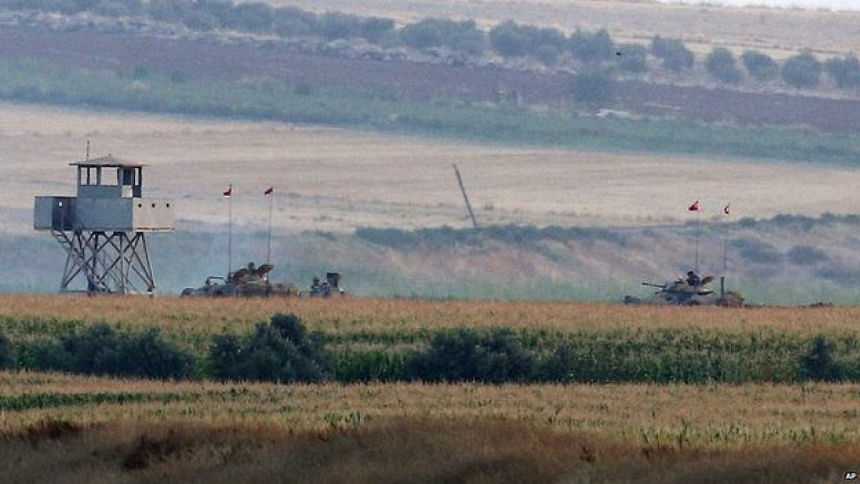Turkish jets strike IS and PKK

Turkish air force jets have carried out fresh strikes against Islamic State (IS) positions in Syria and also hit Kurdish militants in northern Iraq.
It was the second successive night that Turkey had targeted IS.
It follows a week which saw a bomb attack blamed on IS kill 32 people in the Turkish town of Suruc, and border clashes with the militant group.
The Iraq strikes were the first time Turkey had attacked the Kurdistan Workers' Party since a 2013 truce.
The group, also known as the PKK, has been fighting Turkey for an autonomous homeland for the Kurds for decades.
The PKK's military wing said it killed two Turkish police officers on Wednesday. The group claims the men had collaborated with IS in the bombing in Suruc, which targeted left-wing activists.
A government statement issued on Saturday said the air force had hit PKK shelters, bunkers, storage facilities and other "logistic points" in northern Iraq, including the Qandil mountains where the PKK's high command is based.
It did not give details of what the jets had targeted in their attacks on IS in Syria.
Prime Minister Ahmet Davutoglu has said the strikes against IS are part of a broad "process".
Turkey arrested hundreds of suspected IS supporters on Friday, and has also said it will let the US use a key airbase to attack IS targets.
The Turkish government has faced criticism at home and abroad for not doing enough against IS, despite being part of the international coalition fighting it.
Friday's air strikes marked the first time Turkey has confirmed air strikes against targets in Syria since IS began its advance through Iraq and Syria in 2013.
"This is a process," Davutoglu said. "It is not limited to one day or to one region. The slightest movement threatening Turkey will be retaliated against in the strongest way possible."
He said Turkey was prepared to send troops across the border into Syria "if there was such a need".
The agreement to let the US use the Incirlik airbase, following months of negotiations, was finalised in a phone call between President Barack Obama and Turkish President Recep Tayyip Erdogan.
It could allow the US to step up air strikes against IS, as it is closer to northern Syria and Iraq than the Gulf, which currently serves as a launch-pad for bombing missions.
Erdogan said the US-led coalition against IS would be allowed to use the base "within a certain framework" - but did not specify what this would be.
A return to Incirlik
The US military is more than familiar with the southern Turkish base, and its recent history is tied closely with recent US military operations.
- During the first war against Iraq in 1990, US planes were stationed at the base
- Humanitarian operations for Kurdish refugees flew out of Incirlik after the war
- The base also served as the main hub for operations at the start of the war in Afghanistan in 2001
- It acted as the first stop on the way home for thousands of US troops leaving Iraq after the 2003 invasion
- Wikileaks claimed the US and Turkey allowed the base to be used to launch rendition flights for terror suspects
Analysis: Guney Yildiz, BBC News
Picking two simultaneous fights with both the Islamic State and the Kurdistan Worker's Party (PKK) is a really difficult game to play for Turkey's military strategists.
Tactics like employing suicide bombs against civilians make IS a very dangerous group. The PKK, on the other hand, is a totally different organisation with mass support across Kurdish regions of Turkey and Syria. The Turkish-Kurdish opposition People's Democracy Party (HDP), which is seen as close to the PKK, won 13% of the vote in June's general election.
The air strikes on the PKK bases in Iraqi Kurdistan follow a gradual increase in tension between the Turkish government and the Kurdish movement in the run-up to the elections.
The two sides have been engaged in a peace process that started in early 2013 and a ceasefire has held for the best part of two years. Turkish officials say tension has risen because the PKK leadership has refused to disarm and has started to carry out attacks against security forces. However, the PKK accuses the government of publicly abandoning the peace process, while adopting a nationalist discourse and cracking down on Kurdish activists.

 For all latest news, follow The Daily Star's Google News channel.
For all latest news, follow The Daily Star's Google News channel. 



Comments